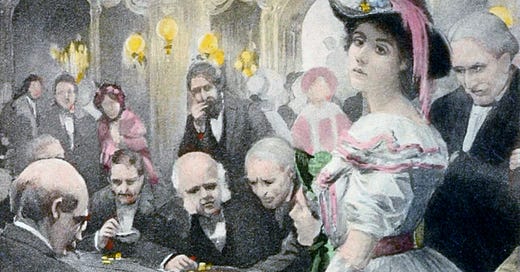A Victorian novel about the future of Judaism
"There is no new thing under the sun." Ecclesiastes 1:9 (KJV)
The 19th-century English novelist Marian Evans published under the name George Eliot and went by the name Marian Lewes, or Mrs G H Lewes. She was one of the most acclaimed and financially successful authors of her time. She was not married to Lewes but referred to him as her husband, and she used a male pseudonym in part because of her unusual domestic situation.
I come back to her, and to her last novel, because of what’s happening in Gaza and on US college campuses. I picked up Daniel Deronda for the first time this winter without realizing that it had anything to do with Jewish life and thought. The main character, a young Englishman, had been adopted and during the course of the story discovers that his mother was Jewish. There are other Jewish characters, some very good and some not so good. Daniel Deronda has to figure out just who he is and what the revelation about his mother means to his future.
Quite a few literary critics, in George Eliot’s time and more recently, have been dismissive of the novel. But Clare Carlisle, author of The Marriage Question: George Eliot’s Double Life, sees it as evidence of Eliot’s intellectual depth and political awareness:
During their travels Eliot and Lewes [her husband] had watched at close quarters as European nations came into being: Italy in the 1860s, the Romola years, and Germany in the early 1870s. Could the Jewish people dispersed across the continent become a nation too? There seemed to be a growing consciousness of 'the wonderful union of Religion and Nationality in Judaism', as one nineteenth-century rabbi put it — and this consciousness was often concentrated on Palestine, a site of Jewish memory and longing. Emanuel Deutsch had talked many times about his hopes for a Jewish homeland. After his first brief visit to Jerusalem in 1869, his eyes would fill with tears when he recalled standing at the Wailing Wall 'among his own people'.
Daniel Deronda stages a debate on the future of Judaism in a fictional pub named the Hand and Banner in London's Holborn district, where a 'philosophical club' of working men meets once a week. Here idealistic Mordecai envisions 'a land and a polity' where his people may 'share the dignity of a national life'. Pragmatic Gideon, who sees himself as a 'rational Jew', argues that 'a man's country is where he is well off': he wants to abandon all 'superstitions and exclusiveness' and 'melt into the populations we live among'.
I’ve been thinking about that today.
We can agree that the situation in Gaza is horrible and heartbreaking, and that innocent people should not suffer or die in the course of conflicts they didn’t start and didn’t want. We differ, I’m sure, in our thinking about causes and solutions.
I do not know much about the Middle East and almost nothing about Israeli political parties or all the different factions in the Islamic Middle East, or about the various terrorist groups including Hamas.
What I do know is that Israel has a right to exist, and that its neighbors have not welcomed its presence. The current leadership of Israel shows all the worst characteristic of strongman style leadership, coupled with corruption and some surprisingly inept security. (Even I had picked up that Israeli special forces were supposed to be the best in the world, and known for their targeted missions.)
It’s also clear that Hamas is a band of murderous thugs with surprisingly effective PR. But that could have been countered by intelligent, rational operators because what’s happened isn’t a surprise. The New York Times columnist Tom Friedman predicted, immediately after the October 7th massacre, that Israel would handle things badly and that reprisals would redound on them.
The mezuzahs on my doorposts
I had a Scottish boyfriend once. He was also Jewish. The Scottish part always seemed more significant. Other men in my life have been Jewish. They weren’t observant and this never seemed important. B…
I was thrilled and relieved by the US funding votes last Saturday, signed into law by President Biden on Tuesday. The delay in funding for Ukraine had been affecting my sleep. I have no doubts about the urgency of that war. But I have deeply mixed feelings about funding the Israeli government and its military and, like many, would like the US to use its leverage, especially now that we’ve seen the tactics of the Israeli military, as well as the willingness of Hamas to make use of their own innocent compatriots. Is there any precedent for this in human history?
But I feel ill when I hear about students protesting Gaza without first acknowledging that the conflict was initiated by a terrorist organization that slaughtered and took captive hundreds of Israelis. Or when someone fiercely defends Israel without acknowledging the tragedy of Gaza.
This is a oft-cited poem, of course, but speaks as clearly as when it was written by the English cleric John Donne in the 17th century:
No man is an island, Entire of itself; Every man is a piece of the continent, A part of the main. . . . Any man's death diminishes me, Because I am involved in mankind.
Being against things is easy. Marches and protests often bring a warm sense of human bonding, something we all long for. It would be a lot more useful if students would apply their fine minds to solutions that take into account the complex world they will soon have to operate in. I was really annoyed at an email from a particular politician this weekend because he tied the Saturday Ukraine, Israel and other funding votes to Earth Day in a duplicitous way. The email was from a newbie 33-year-old Senate candidate in West Virginia named Zach Shrewsbury, a rough-looking guy who offers himself as a working-class Democrat who understands the concerns of a mostly Republican state. Okay, he is very young and he hasn’t got a prayer, but I am always looking for moderate candidates and was on his mailing list. Here’s what the weekend email said:
Hi Karen,
It’s Earth Day. If you are like me, you’ve just about had it. You are sick of hearing how important climate action is to a candidate, how dedicated this or that politician is to reducing greenhouse gas emissions, and how committed your city’s sustainability department is to environmental conservation, a healthier planet, and a brighter future. You are almost numb to reading about the economic damage climate change is causing year after year. You know that even this year’s Earth Day theme sounding alarm on how microplastics release toxic chemicals into our food and water sources and circulate through the air we breathe will not change our corrupt lawmakers’ mode of operation.
Just as organizations across the globe had been preparing to honor and celebrate our remarkable planet, the most powerful parliament in the world—our own Congress—passed a bill to dedicate another $95 billion to wars. On top of exacerbating human suffering and aiding Israel’s apartheid, this financial infusion alone will dwarf any federal efforts dedicated to reducing fossil fuel emissions this year.
On this Earth Day, I want to honor these 37 U.S. House Representatives who voted against wars, violence, and environmental destruction that $95 billion in bombs, offensive weapons, and other unconditional military aid will cause. Remember their names.
War is terrible for the environment in myriad ways. But letting Putin win in order to “celebrate our remarkable planet”? Absurd. Just as bad, the letter is completely misleading. The 37 representatives he’s so excited about did not vote against war when it came to Asia or Russia. They did not vote “against $95 billion in bombs” but only against $26 billion “in wartime assistance to Israel and humanitarian relief to citizens of Gaza.” Fair enough, though I hope they turned around to do something about humanitarian funding. But say it out loud. Don’t pretend. Don’t lie or distort. Otherwise, some might wonder if this was antisemitism veiled as environmentalism. (Not unknown in history, or even in more recent times. In fact, I commissioned an article on “Eco-fascism” for the new edition of the Encyclopedia of Sustainability.) Here are the actual House funding votes from Saturday.
If you’ve read Daniel Deronda, I’d love to know what you think about George Eliot’s Jewish characters. Most are very sympathetic, but there is one, Lapidoth, more typical of the Jewish stereotypes of the time. Clare Carlisle makes a brilliant and amusing observation about him. She points out that “seedy Lapidoth . . . looks and moves like Lewes [Eliot’s beloved husband], and echoes his easy, vivacious talk,” in addition to living off women. George Eliot, you see, was not only the main breadwinner in her own marriage but supported her husband’s legal wife and children. It’s that kind of attention to detail that makes The Marriage Question such an intriguing biography, as well as a primer on European philosophy.
Postscript
I’ve been talking to a colleague about the awkwardness many biographers feel about mentioning a woman’s beauty, or lack of it. This applies to any comment on physical appearances, I suppose, but especially to women. This reticence can have comical results. I was looking for other biographies of George Eliot and found a Guardian review of Nancy Henry’s Life of George Eliot that begins:
The cover photograph on this new George Eliot biography tells you immediately that something is up. Virtually every book about the novelist in modern times has used one particular image, a highly flattering portrait done by a man with whom Eliot was half in love. In it the young woman has unaccountably become blonde, her nose has shrunk and she has acquired a dear little chin. Nancy Henry's new biography, by contrast, announces its subject with a photograph of Eliot at the age of 40, about the time she published her first novel, Adam Bede. Here her witch's nose is offset by a warrior's jaw. A strained half smile reveals several lost teeth, while the lank brown hair neither lies smoothly nor curls becomingly. Henry's Eliot is not what you'd call a looker. | It is a bold start to what is clearly intended as a different kind of biography. Read the rest.
Yet, as you can see, the newspaper’s editor put a much more flattering portrait at the top of the review and did not include the book jacket itself with the photograph Eliot herself wanted destroyed.









In 2012, before your pub of Mudricks books: https://www.hoodedutilitarian.com/tag/marvin-mudrick/